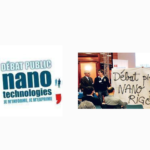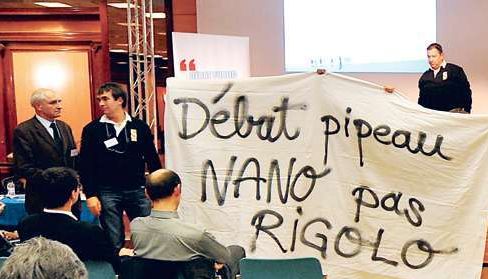
The 2009-2010 national public debate on nanotechnology

The 2009-2010 national public debate on nanotechnology
By the AVICENN team – Last updated April 2019
A commitment of the Grenelle de l’Environnement
One of the commitments of the “Grenelle de l’Environnement” in 2007 was for the National Commission for Public Debate to organize a debate on the risks associated with nanoparticles and nanomaterials1Commitment n°159 of the Grenelle de l’Environnement, November 2007: “the National Commission for Public Debate will organize a debate on the risks associated with nanoparticles and nanomaterials”, p.23/35.
A heated debate
The national debate on “the development and regulation of nanotechnologies” was held in France from October 2009 to February 2010 at the request of eight ministries (ecology, labor, health, agriculture, higher education & research, economy and defense).
Organized by the National Commission for Public Debate (CNDP), it provided the public with a certain amount of information from :
- the public authorities (the official file of the project owner in particular)
- the various stakeholders (public debate stakeholders, institutions, industry or associations), in particular the 51 stakeholders’ papers, written positions published by the CPDP

The debate was nevertheless fiercely opposed by activists led by the Grenoble-based group “Pièces et main d’oeuvre” (PMO), for whom the debate was only a masquerade, a “sham debate” intended to legitimize the “techno-science rush” – since the French government had already at the time committed itself massively to supporting nanotechnologies. Most of the public meetings were subject to disruptions (in particular in Grenoble, Marseille or Lyon2Nanotechnologies, we don’t want them in Lyon, video of the disruptions of the Lyon debate), or even cancelled (in Montpellier, Nantes or Paris) to be held behind closed doors with a retransmission on the internet3For a review and analysis of the facts, see in particular:
– the book by sociologist Brice Laurent, The politics of nanotechnology 2010, pp.179-188: “Le débat public CNDP ou la représentation des arguments à l’épreuve
– Science and Democracy’s contribution to the national public debate on nanotechnology, Jan. 28 2010, leading some to describe this debate as a “fiasco”4Pierre Le Hir, “Nanotechnologies : les raisons d’un fiasco”, Le Monde, 24 Feb. 2010; see the List of main articles published during the months of September 2009 to February 2010 identified by the CNDP.
In a working paper “For a public participation process adapted to the responsible development of new technologies”5For a public participation process adapted to a responsible development of new technologies, Centre d’Analyse Stratégique, Working Paper n° 3, October 2011, the Centre d’analyse stratégique explained the difficulties faced within the debate process by:
- the lack of coordination between the debate and the political decision and calendar: the debate began in the autumn of 2009, while a Government support plan for the development of nanotechnologies had been announced in the spring, notably through the financing of the plan NanoInnov with 70 million euros per year over five years
- the technical, political and general nature of the subject
- the lack of a single contact for the public and the lack of personalization of the project owner represented by seven different ministries
- the marginalization of the issue of the supervision of existing nano products, stifled by considerations concerning the opportunity of future developments.
The CPDP finally published a report and a summary of the debate in April 2010.
The government was slow to respond
The normal procedure provides that within three months of the publication of the report and minutes of the debate, the project owner (in this case, the seven ministries concerned) announces its decision as to the action it intends to take on the project in the light of the opinions expressed during the public debate. As the CNDP website still displays, an official response from the government on the follow-up to the debate was expected “before the end of July” (2010…).
Due to differences between the seven ministries on the responses to the national debate, multiple interventions were required6In particular, on May 31, 2010, Mr. Deslandes, President of the CNDP, at a public hearing at the Office Parlementaire d’Evaluation des Choix Scientifiques et Technologiques (OPECST), or on October 18, 2010 at the meeting organized by the Institut pour la Maîtrise des Risques “Regards sur les Nanotechnologies: enjeux, risques, perspectives” in Cachan, and again at the Conference “How to debate new technologies?” organized on November 8, 2011 by the Centre d’Analyse Stratégique (CAS) : see the Presentation by Jean Bergougnoux, President of the CPDP on nanotechnology during the 2009-2010 public debate before the government responded a year and a half later: an interdepartmental communiqué presenting the “commitments” of the government (the last Fillon government) on the follow-up to the debate was established on October 27, 2011; it took another three and a half months for it to be communicated to the CNDP, in a letter dated February 13, 2012. The press release indicated that the expectations and demands of French society “have been heard by the government”. The government’s “commitments” were broken down into three sections: to better assess and prevent risks, to inform the public (in particular via an information portal nano.gouv.fr), and to involve civil society in the governance of nanotechnologies. This addressed many of the wishes expressed by the majority of stakeholders who participated in the national debate.
Has the response fallen into oblivion?
These commitments were made in February 2012, four months before the presidential election and the change of majority.
Subsequent governments have not taken much notice of the issue. The information portal nano.gouv.fr was never created.
Worse, the interministerial working group called “nano task force”, which was supposed to lead this work, was deprived of its secretary in 2014.
Since then, AVICENN has been working to obtain a better governance of nanos, in particular by working for more transparency and vigilance.
– Official website of the national debate on nanotechnologies: the initial URL http://www.debatpublic-nano.org has now expired; its archives are nevertheless available here: http://cpdp.debatpublic.fr/cpdp-nano
– The aftermath of the nanotechnology public debate, Ministry of Ecology, Sustainable Development and Energy, February 16, 2012
– Nanotechnologies : le débat impossible, Les Echos, 27 mars 2011
– Nanotechnologies – Le grand débat, video, 16′, Clémentine Lerat, 2010
– Nanotechnology. Debris and dust – Contribution to the assessment of the public debates on nanotechnologiesZ: A Traveling Journal of Inquiry and Social Criticism, No. 3, pages 28-35, 2010
– Les nanotechnologies en débat, RFI, October 2009
– See also the 51 stakeholder papers from organizations that took a position during the 2009-2010 national public debate on nanotechnology
Any questions or comments? This information sheet compiled by AVICENN is intended to be completed and updated. Please feel free to contribute.
Other news on the topic
Upcoming Nano Agenda
- Introductory seminar on the principles of Life Cycle Assessment (LCA) and its specificities when applied to nanomaterials (metal nanoparticles, oxides, etc.), from their production to their end-of-life.
- Organizer: NaMasTE research group (Manufactured Nanomaterials, Toxicology, Ecotoxicology and Risks: Towards Controlled Development)
- Speaker: Gaetana (Tania) Quaranta, Senior Lecturer, University of Strasbourg – IPHC
- Website: https://gdr-namaste.cnrs.fr/

- Webconference for analysis laboratories, plant fertilizer manufacturers and distributors, public authorities…
- Moderated by David Krupka, nanotechnologies development manager at AFNOR Normalisation and Emilie Langlois-Bertrand, nantechnologies standardization project manager.
- In partnership with Armand Masion (CEREGE) and Patrice Charpentier (ANSES).
- This exchange will also be an opportunity to explore the creation of a national platform to identify standardization needs.
- Website: https://www.afnor.org/evenements/qualite/nanotechnologies-agriculture-cadre-pratique-responsable

- International conference on metallic nano-objects for experts working in the interdisciplinary field of metallic nanoparticles, with a particular emphasis on nanoparticle synthesis and characterization, plasmonics, optics and photonics, catalysis, biomedicine, electronics, and nanoparticle recycling
- Organizers / Partners: CNRS, Bordeaux University, Bordeaux INP, ICMCB, CRPP, CBMN, ISM
- Website: https://mno2026.sciencesconf.org
File initially created in February 2012
Notes and references
- 1Commitment n°159 of the Grenelle de l’Environnement, November 2007: “the National Commission for Public Debate will organize a debate on the risks associated with nanoparticles and nanomaterials”, p.23/35
- 2Nanotechnologies, we don’t want them in Lyon, video of the disruptions of the Lyon debate
- 3For a review and analysis of the facts, see in particular:
– the book by sociologist Brice Laurent, The politics of nanotechnology 2010, pp.179-188: “Le débat public CNDP ou la représentation des arguments à l’épreuve
– Science and Democracy’s contribution to the national public debate on nanotechnology, Jan. 28 2010 - 4Pierre Le Hir, “Nanotechnologies : les raisons d’un fiasco”, Le Monde, 24 Feb. 2010; see the List of main articles published during the months of September 2009 to February 2010 identified by the CNDP
- 5For a public participation process adapted to a responsible development of new technologies, Centre d’Analyse Stratégique, Working Paper n° 3, October 2011
- 6In particular, on May 31, 2010, Mr. Deslandes, President of the CNDP, at a public hearing at the Office Parlementaire d’Evaluation des Choix Scientifiques et Technologiques (OPECST), or on October 18, 2010 at the meeting organized by the Institut pour la Maîtrise des Risques “Regards sur les Nanotechnologies: enjeux, risques, perspectives” in Cachan, and again at the Conference “How to debate new technologies?” organized on November 8, 2011 by the Centre d’Analyse Stratégique (CAS) : see the Presentation by Jean Bergougnoux, President of the CPDP on nanotechnology during the 2009-2010 public debate



